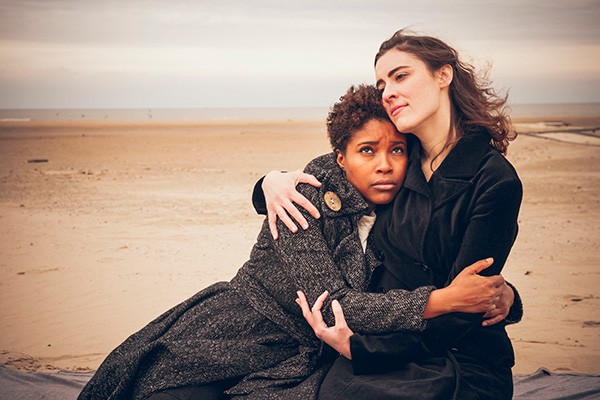
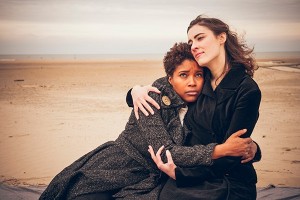 Highly Recommended ***** As I entered the The Frontier’s space for Core Theatre’s production of Christina: The Girl King, I was immediately impressed by the technical aspects of the production on display, including actors already moving and speaking inaudibly in costume. My admiration only increased for the duration of the play. While It would be cost-prohibitive to use even reproductions of authentic 17th century upper class Sweden as props, the Furs and Gowns, Jewel’s, gloves (Costumes: Alarie Hammock), antlers mounted on the wall, crystal wine glasses to the side, and a stately, white, chair positioned as Christina’s throne (Props: Elyse Balough) all give a deeply real sense of an Early Modern Scandinavian court. Additionally, incredible lighting design (Eric Vigo) produces throughout an artic remoteness even during theatrical variations of importance. Likewise, the sound (Jeffry Levine) features blizzards, ice, snow and tones of isolation, and even, tension. For not only does the many technical facets of the show continually anchor us in time and place, the sound, props, lighting, and even costumes simultaneously serve symbolic, thematic, and narrative purposes, sometimes overtly and sometimes at a semi-conscious but unmistakable level.
Highly Recommended ***** As I entered the The Frontier’s space for Core Theatre’s production of Christina: The Girl King, I was immediately impressed by the technical aspects of the production on display, including actors already moving and speaking inaudibly in costume. My admiration only increased for the duration of the play. While It would be cost-prohibitive to use even reproductions of authentic 17th century upper class Sweden as props, the Furs and Gowns, Jewel’s, gloves (Costumes: Alarie Hammock), antlers mounted on the wall, crystal wine glasses to the side, and a stately, white, chair positioned as Christina’s throne (Props: Elyse Balough) all give a deeply real sense of an Early Modern Scandinavian court. Additionally, incredible lighting design (Eric Vigo) produces throughout an artic remoteness even during theatrical variations of importance. Likewise, the sound (Jeffry Levine) features blizzards, ice, snow and tones of isolation, and even, tension. For not only does the many technical facets of the show continually anchor us in time and place, the sound, props, lighting, and even costumes simultaneously serve symbolic, thematic, and narrative purposes, sometimes overtly and sometimes at a semi-conscious but unmistakable level.
This is matched with what I assume is the deliberate cast of a sole black actress to play Christina (Toya Turner), which increases her own sense of isolation from her white family, white courtiers, and snow-drenched country. Both because she is Queen and therefore separate and above anyone, but also because she challenges the norms of gender and sexuality, is educated and wants to educate a country (which in the play) is interested only in war, and shows a keen interested in peace, learning, and the despised Roman Catholic religion. So much so, that she invites the French Philosopher Descartes (Danny Taylor) to her court (where he eventually meets his death by poison) to teach her how to rid herself of a forbidden lesbian passion for the Countess Ebba Spare (Laura Ressinger). However, Christina finds that Lutheran determinism gets in the way of the Cartesian philosophical insistence on free will, pushing her further away from what she sees as Luther’s insularism. Consequently, Descartes, and his Ambassador Chanut (Scott Schimizu), try to exploit the situation to bring her into full communion with the Roman Catholic faith and accept the pope’s invitation to be Rome’s Virgin Queen. Meanwhile, male suitors pursue her: her cousin Karl Gustave (Adam Gutkin), out of passion and her adopted brother (Johan) (William Van Vogt), out of lust for power, even going so far as to recruit the insanity-racked Queen Mother Maria Elanora (Meg Elliot) to persuade her, to marry him.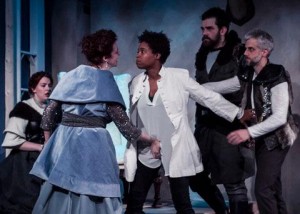
While the press packet warned of graphic blood and full nudity, what struck me the most was the degree of emotional violence present in Michael Mark Bouchard’s script, consummately maintained in Natasha Fowler’s direction and her actors’ performances. Turner, while occasionally struggling to make her lines fully audible, nevertheless, is able to go from coarse-mouthed queen, to learned philosopher, to passionate lover in the blink of an eye, all the while maintaining intense authority and a determined regality even at the moment of her abdication. This might seem unrealistically dizzying, except for her lady in waiting’s (Bridgette Schreiber) surreptitious observances of the queen’s conduct and her reports to the audience about the subsequent changes in Christina’s moods. Schreiber’s terror in her quiet observance is palpable and her narrative Soliloquys’ haunting. Meanwhile, Elliot’s Queen Mother’s delicate features and dress set off and highligh what amounted shrieking madness well-executed by Eliiot. Ressinger is extremely and convincingly delicate throughout and it is fascinating to watch how well she and Turner are able to represent an intense bond despite the dramatic difference’s in their characters’ temperaments. Arouhnd all of this, Taylor’s Descartes buzzes with an intense nervous energy, eruditely spouting ideas about those things we can love and hate (things of which we are awful lot of them on the stage
Historians often complain about authors taking historical liberties when the truth is far more complex and interesting. I tend to agree; however, the bare bones outline of this play is correct and much of it (Christina’s lesbianism, Descartes’ murder) is at least plausible, or rumored, if not likely. Moreover, the changes to the historical narrative made here thematically explore modern themes: it’s needless to say that it is unlikely that Christina’s feelings for Ebba, whatever they may have been, were linked to her conversion to Roman Catholicism); Descartes and Christina hated each other once he arrived and though Christina’s mad mother really did live with her husband body for a number of years it was never paralleled by Descartes giving Christina a lesson in anatomy, much the less the human soul, using a cadaver; and one of the most interesting parts of Christina’s life, the period after her abdication, was under-represented. Still, the play works, and the historical discrepancies aren’t so vast that they don’t tell us something deeply true about “Christina: The Girl Queen:” a famously enigmatic figure whom a pope is reputed to have called “a Queen without a country, a Christian without faith, and a woman without shame.”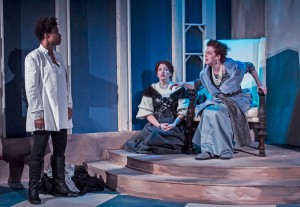
The Cor Theatre’s production of Michael Mark Bouchard’s “Christina: The Girl Queen” is showing at the Frontier Theatre, located at 1106 W. Thorndale Avenue: about a block East of the Thorndale Red Line stop. The show runs through April 9, 20016.
Performances are :
Friday 7:30 pm
Saturday 7:30 p.m.
Sunday at 3:00 pm
Regular Tickets are $25. $10 Tickets are available for student’s and industry. To purchase call the box-office at 866-811-4111 or visit www.CorTheatre.com
To see what others are saying, visit www.theatreinchicago.com, go to Review Round-Up and click at “Christina: The Girl Queen”

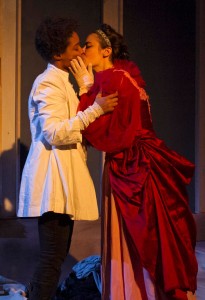





More Stories
” Diary of a Black Illusionist: Walter King Jr.”/ Chicago Magic Lounge reviewed by Paul Lisnek
“Survivors” reviewed by Julia W. Rath
“Prayer for the French Republic” reviewed by Julia W. Rath ( and another by Paul Lisnek)